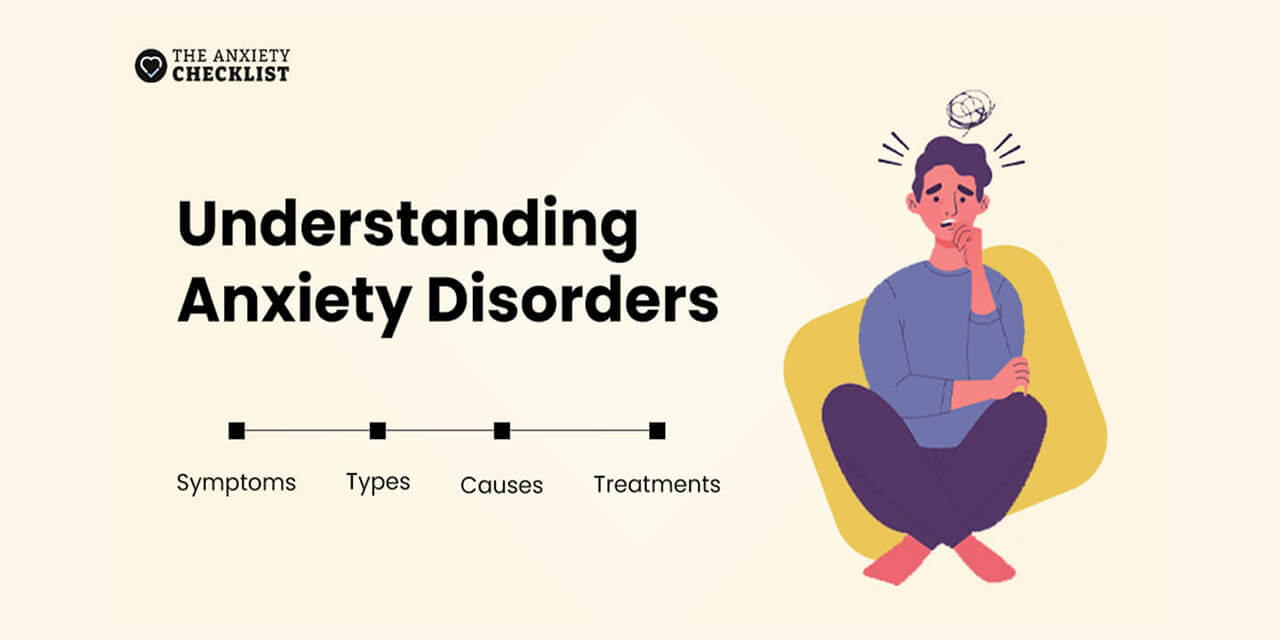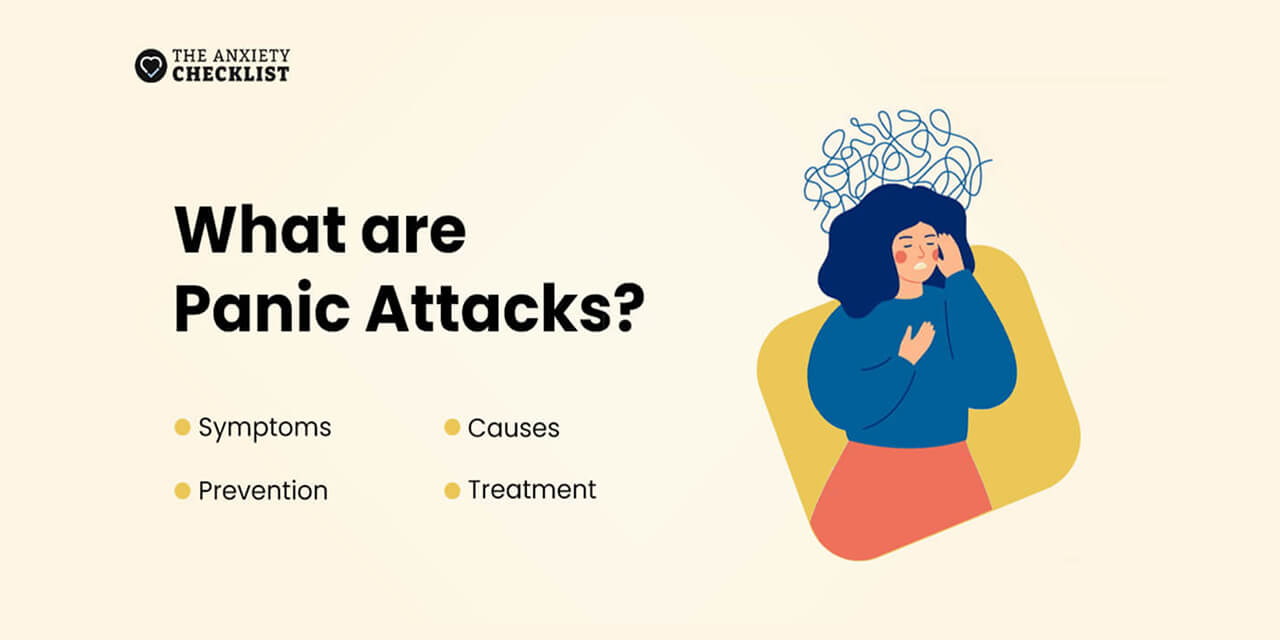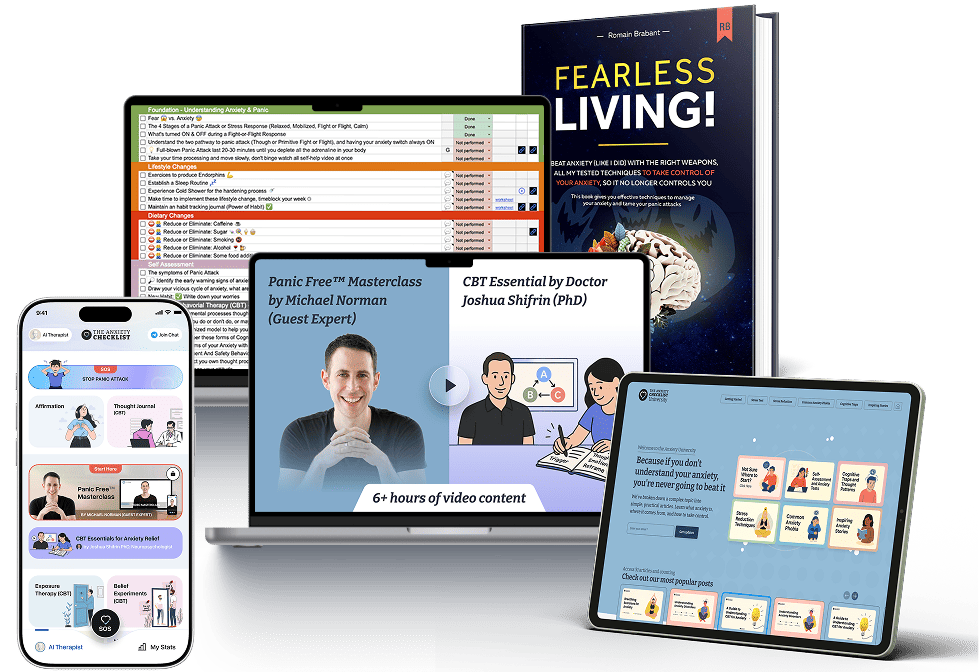- Do you imagine worst-case scenarios in low-risk situations? Do you seek constant reassurance to ease your concerns?
- Are you always fearing the what-ifs?
- Well, you're not the only one. Anxiety is no stranger to most of us.
- Believe it or not, anxiety isn't always the villain in the story of our minds. In smaller doses, it's like our built-in alarm system, nudging us to pay attention and stay focused.
- But when anxiety becomes the director instead of the supporting actor, things get tricky.
- Unfortunately, this shift is becoming more common. In 2023, 37% of U.S. respondents reported increased anxiety from the previous year - a problematic anxiety statistic
The good news is that there's plenty we can do to make a difference. The bad news? Not everyone knows how. But that's exactly why you're here.
When anxiety hits, do you know what to do next?
Learn how to calm your body, interrupt fear loops, and regain control step by step.
Are Anxiety Disorders and Everyday Anxiety the Same?
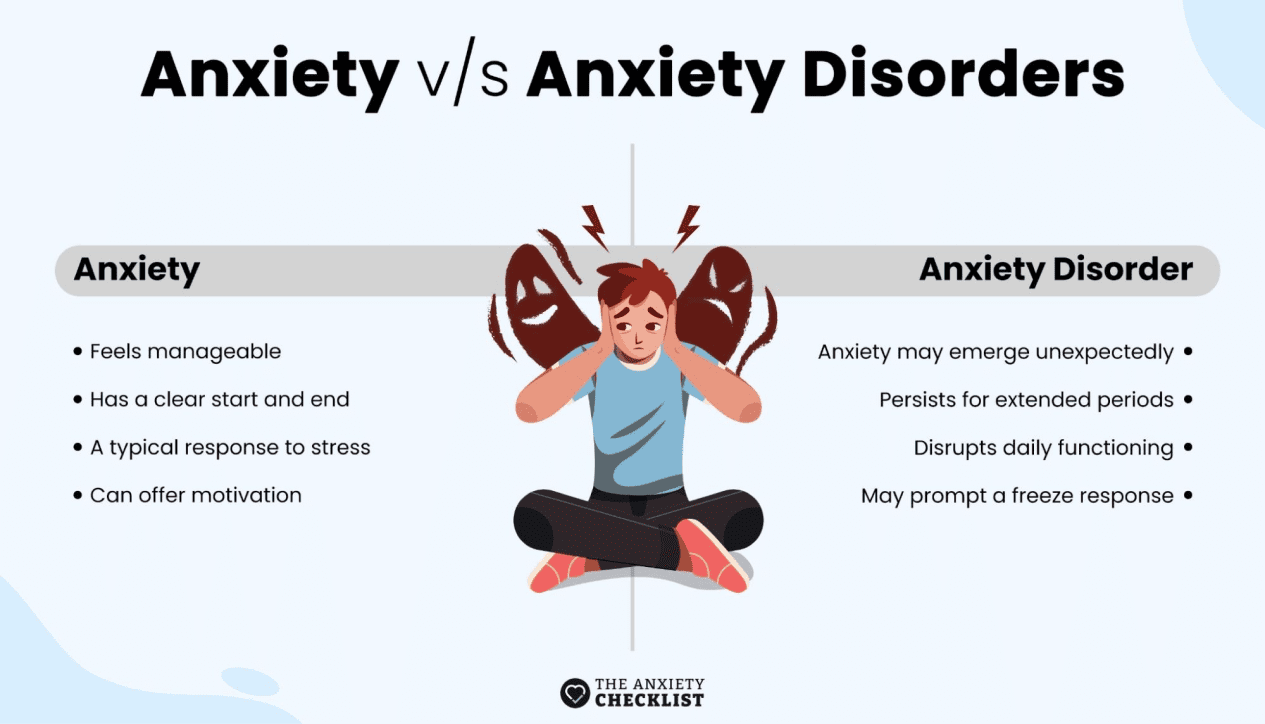
- Feeling anxious from time to time is part of being human. Nervousness before a presentation, a first date, or a big decision—that’s everyday anxiety. It’s temporary, proportional to the situation, and usually fades when the moment passes.
- But anxiety disorders are different. They’re marked by persistent, excessive worry that interferes with daily life—even when there’s no obvious threat. Getting out of bed, answering a text, or showing up to a job you love can suddenly feel overwhelming.
- To put it simply: if everyday anxiety is like a brief rain shower, an anxiety disorder is more like living through a lingering storm—the kind that clouds your thinking, drains your energy, and reshapes your routine.
- And if that resonates with you, know this: you’re not alone. Millions are navigating similar storms, and with the right support and tools, it’s possible to find your way back to clear skies.
Note: Anxiety disorders are formally diagnosed based on criteria outlined in the DSM-5-TR (Diagnostic and Statistical Manual of Mental Disorders, 5th Edition, Text Revision), which considers frequency, intensity, and impact on daily functioning.
How Doctors Classify Anxiety Disorders
- While it's common to say "I'm anxious," pinpointing the specific type of anxiety you're facing can be tricky. Explore if you fit into any of the following categories:
Generalized Anxiety Disorder
- Ever been lightly criticized and suddenly spiral into thinking you’re about to lose your job? It’s not paranoia. And it definitely doesn’t mean you’re broken.
- This kind of thinking can be a sign of Generalized Anxiety Disorder (GAD)—a condition where worry isn’t just magnified, it’s persistent, excessive, and often uncontrollable. People with GAD experience intense anxiety about everyday situations for six months or more, often without a clear reason.
- And it’s not just mental. GAD can come with physical symptoms too—restlessness, muscle tension, trouble sleeping, and feeling constantly on edge.
- You’re not imagining it. Your nervous system is just working overtime. The good news? With support, tools, and targeted treatment, GAD is highly manageable—and you can learn to reclaim control.
Panic Disorder
- You’re in the middle of a routine day—maybe picking up groceries or catching up with a friend. Suddenly, your heart pounds like an internal alarm, the room feels tighter, and fear surges out of nowhere. An ordinary moment transforms into a full-body crisis.
- This is more than just anxiety—it may be a panic attack, and for some, it’s part of a larger pattern known as Panic Disorder.
- Panic Disorder is defined by recurrent, unexpected panic attacks, often striking without warning. But it doesn’t end with the attack itself. What follows is just as debilitating: persistent worry about having another episode or behavioral changes meant to avoid triggering one.
- This isn’t just fear—it’s the anticipation of fear. And that anticipation can quietly shape your choices, your habits, even your sense of freedom.
- But panic doesn’t have to drive the narrative. With evidence-based tools like CBT, exposure therapy, and somatic regulation techniques, it’s possible to retrain your system—and rewrite the story.
Phobias
- For many people, seemingly harmless situations, like being in a confined space or encountering a particular animal, may send shivers down the spine.
- These intense, irrational fears are what we call phobias. Whether it's a fear of heights, spiders, or open spaces, these phobias can hijack your emotions and daily life.
Separation Anxiety Disorder
- Remember the childhood fear of being left alone? For some, that fear doesn’t fade with age—it matures into something deeper.
- In adults, Separation Anxiety Disorder may not look like tears at the school gate, but the emotional undertow is similar. Whether it’s a partner, a friend, or even a pet, the idea of being separated can trigger disproportionate distress. Routine goodbyes become internal battlegrounds. Everyday moments—like commuting solo or spending the night alone—can spark waves of anxiety.
- While Separation Anxiety Disorder is more commonly diagnosed in children, it is a legitimate condition recognized in adults as well. According to the DSM-5-TR, its prevalence in adulthood is lower than other anxiety disorders, but when present, it often stems from unresolved attachment dynamics or past trauma.
- The good news? With the right therapeutic approach—like CBT, exposure therapy, and emotion-focused techniques—adults can develop security from within and learn to navigate solitude without fear.
Social Anxiety Disorder
- Does the idea of social interactions fill you with an overwhelming fear of judgment? This goes beyond normal nerves; it's the defining feature of Social Anxiety Disorder.
- If that's you, you may have a persistent worry about saying or doing something embarrassing. What's worse, this fear can pop up even in situations with your closest ones.
Regardless of the type of anxiety you're experiencing, there are effective ways to manage it. For starters, you can check out our anxiety checklist, a 93-point guide filled with techniques to calm your mind.
Here's What Might Be Behind Your Anxiety…
- Anxiety doesn’t come out of nowhere. It’s often the result of a complex interplay between your biology, upbringing, and how you’ve learned to navigate the world.
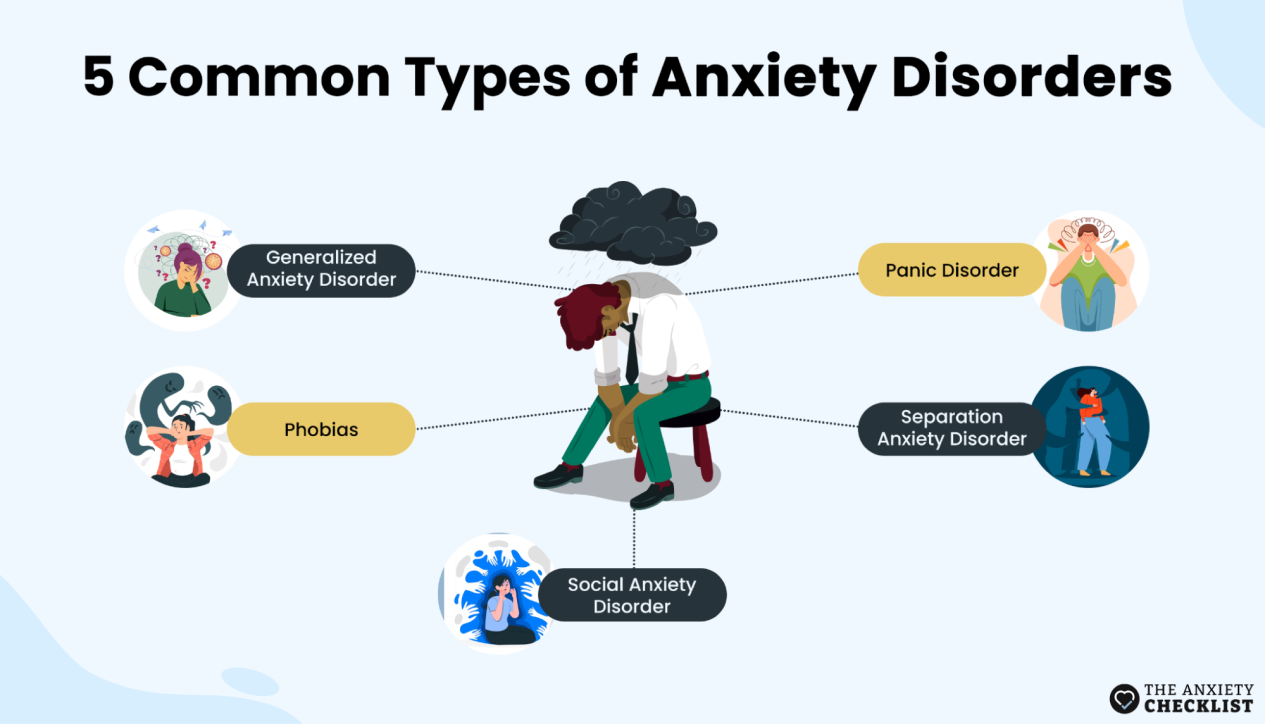
- Maybe anxiety runs in your family. If your parents or grandparents struggled with it,
- you may carry a genetic predisposition—but that’s only one piece of the puzzle. Genetics create a vulnerability, not a destiny. What often activates that vulnerability? The environment.
- Childhood trauma, neglect, or prolonged stress can wire your nervous system to stay on high alert, leaving echoes of fear that carry into adulthood. These experiences can shape how your brain responds to future stressors—sometimes interpreting ordinary challenges as threats.
- But there’s more. Neurobiological factors, such as an overactive amygdala or imbalances in neurotransmitters like serotonin, norepinephrine, and GABA, can influence how intensely we experience fear and how quickly we recover from it.
- Your personality traits and thinking patterns also play a role. Take perfectionism, for instance—striving to meet impossible standards can turn everyday tasks into pressure cookers. Over time, these mental habits reinforce chronic stress responses.
- The truth is, anxiety is multifactorial. It’s shaped by your wiring, your story, and the strategies you’ve learned to survive. Understanding this doesn’t just explain where your anxiety comes from—it empowers you to work with it, not against it.
- Self-awareness is the beginning of self-compassion. And both are foundations for change.
Is Modern Living to Blame for Our Anxiety?
- In February 2023, nearly one-third of U.S. adults (32%) reported symptoms of anxiety or depression, according to the CDC’s Household Pulse Survey. While the numbers are high, it’s important to clarify that these self-reported symptoms do not necessarily mean a clinical diagnosis of an anxiety disorder.
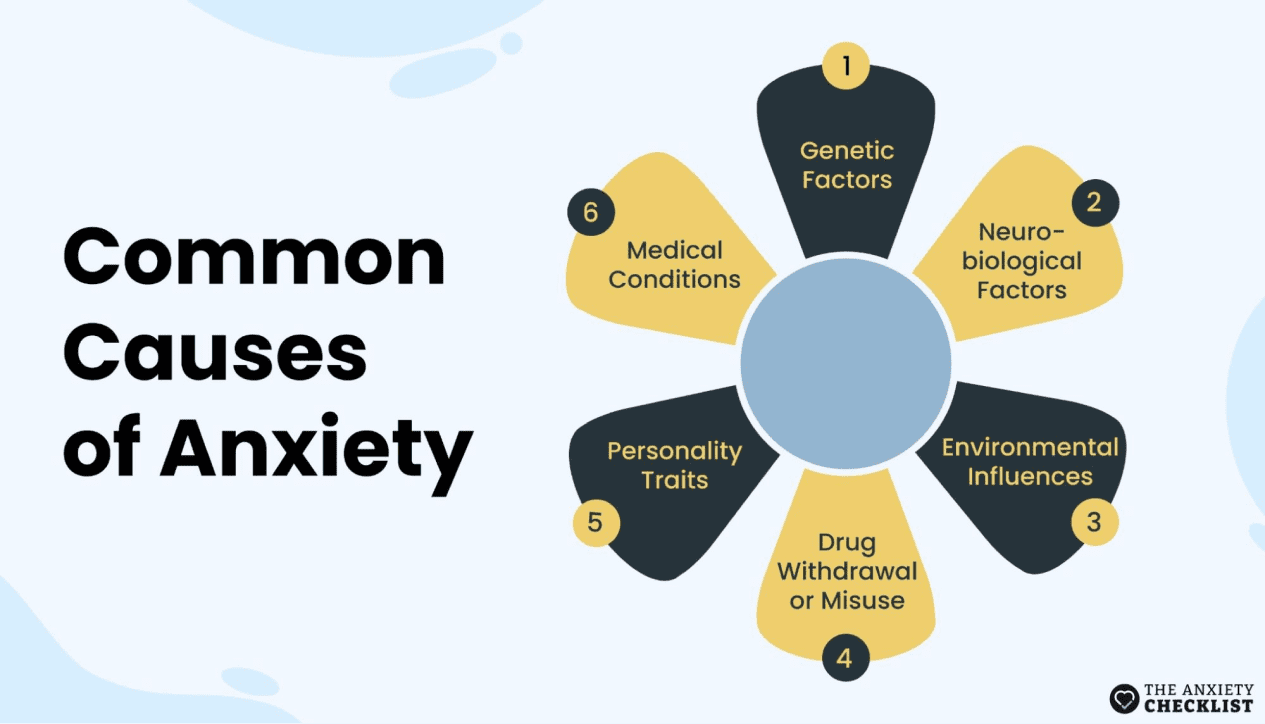
- Instead, many of these cases reflect situational or transient anxiety, often triggered by modern stressors that bombard us daily. Here are some of the most common culprits:
Fast-Paced Life
- We're always in a hurry, rushing from one thing to the next, like a race that never ends.
Social Media Onslaught
- Everyone's showing off their best moments on social media. This may make us feel like we're not doing enough.
Information Overload
- There's too much to know every day, like trying to drink water from a fire hose—too much, too fast.
Tech Advancements
- Technology connects us but also keeps us on edge. The constant pings and notifications make it hard to relax.
Sleep Struggles
- It's hard to get good sleep because we're always busy—as if our brains never get a chance to rest.
Societal Pressure
- The world expects us to be perfect all the time, or so we often think. Trying to be the best at everything can be extremely distressing.
The Vicious Cycle of Anxiety
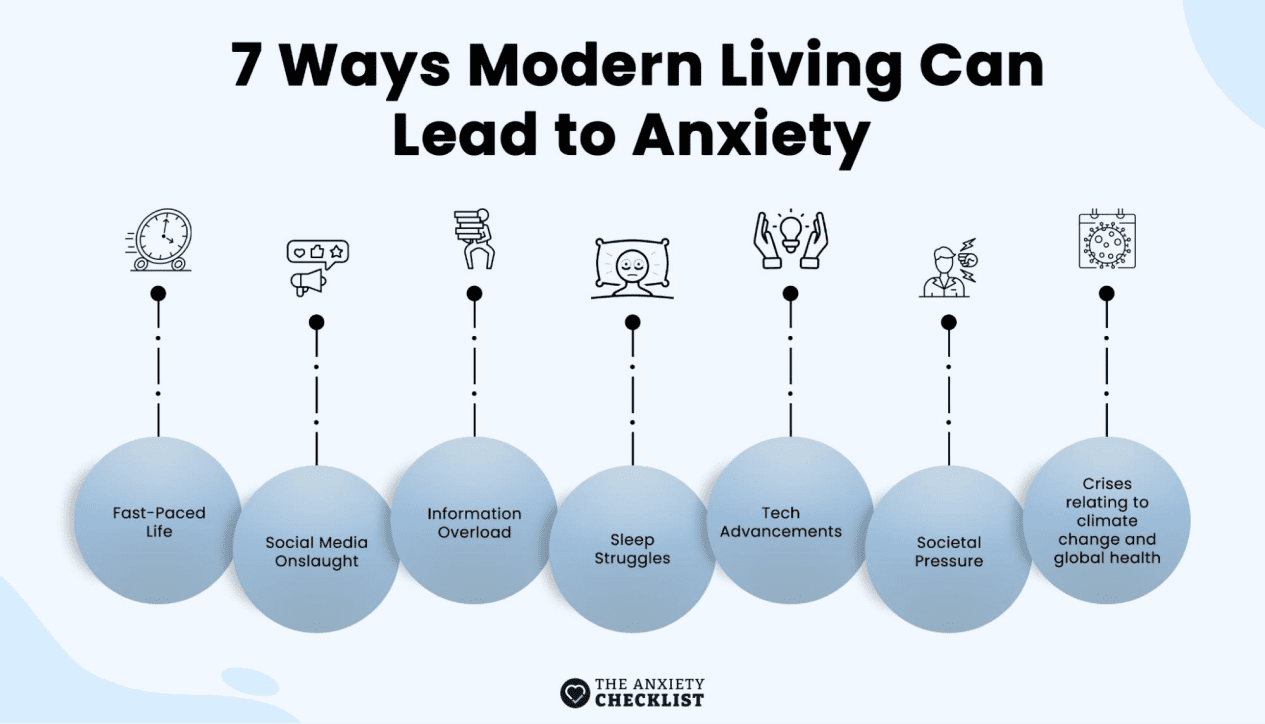
- When you encounter situations that trigger heightened fear, a common response is to avoid those circumstances.
- Take, for example, a fear of public speaking. If you're invited to give a presentation at work and the thought alone makes your heart race, you might decide to call in sick that day.
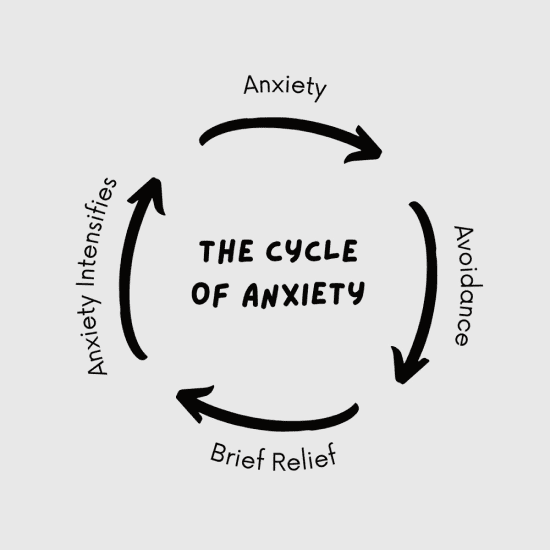
Here's a visual representation of this cycle
- Unfortunately, this avoidance tactic can backfire in the long run.
- When another speaking opportunity arises, the fear of public speaking is now reinforced by the avoidance of the previous presentation. You might start declining more speaking engagements, convinced that dodging these situations is the only way to cope with the anxiety.
- To break this cycle, gradual exposure to fear is crucial.
- You are then not only anxious about public speaking, but also develop a secondary fear—the fear of experiencing that intense anxiety again.
- This can involve starting with smaller speaking engagements. Additionally, if your anxiety feels overwhelming, seek refuge in our anxiety checklist —a go-to resource for calming your mind and emotions.
It's More Than Just Worrying: The Many Symptoms of Anxiety Disorders
- Anxiety varies from person to person—some might relate to the physical & mental effects mentioned below, while others face unique challenges not covered here.
Physical Symptoms
- Rapid heartbeat or palpitations
- Muscle tension, aches, or trembling
- Excessive sweating
- Fatigue and lack of energy
- Sleep disturbances, including difficulty falling asleep or restless sleep
- Teeth grinding, especially at night
- Dizziness or weakness
Mental Symptoms
- Excessive worry about everyday events
- Restlessness and a constant feeling of being on edge
- Irritability and heightened sensitivity
- Difficulty concentrating or feeling easily distracted
- Depersonalization—a form of dissociation that causes a sense of detachment from the mind or body
- Stressing about anxiety itself, such as anticipating when panic attacks may occur
Behavioral Symptoms
- Avoidance of situations that trigger anxiety
- Changes in routine or habits to accommodate anxiety
- Constantly seeking reassurance from others
- Displaying signs of nervousness or agitation in social situations
- Overpreparing for potential future threats or challenges
- You may even find that an anxiety symptom can act as both a trigger and an aggravator.
- Ever had a big deadline stressing you out? Well, imagine this: the closer it gets, the more anxious you become. And here's the tricky part—instead of tackling it, that anxiety makes you delay things. The more you put it off, the more anxious you get. It's like a loop, where anxiety and delaying things keep feeding into each other.
- This shows why it's really important to figure out what's going on and get the right treatment.
How Do You Know If You Have An Anxiety Disorder?
- When you think you might have a simple viral infection, you head to your doctor. Turns out, getting a mental health diagnosis is not too different.
- The very first step in getting a diagnosis is acknowledging that something might not be quite right. It's not always an easy realization, but being kind to yourself can go a long way.
- Once you're ready to start this journey, talk to your primary healthcare provider.
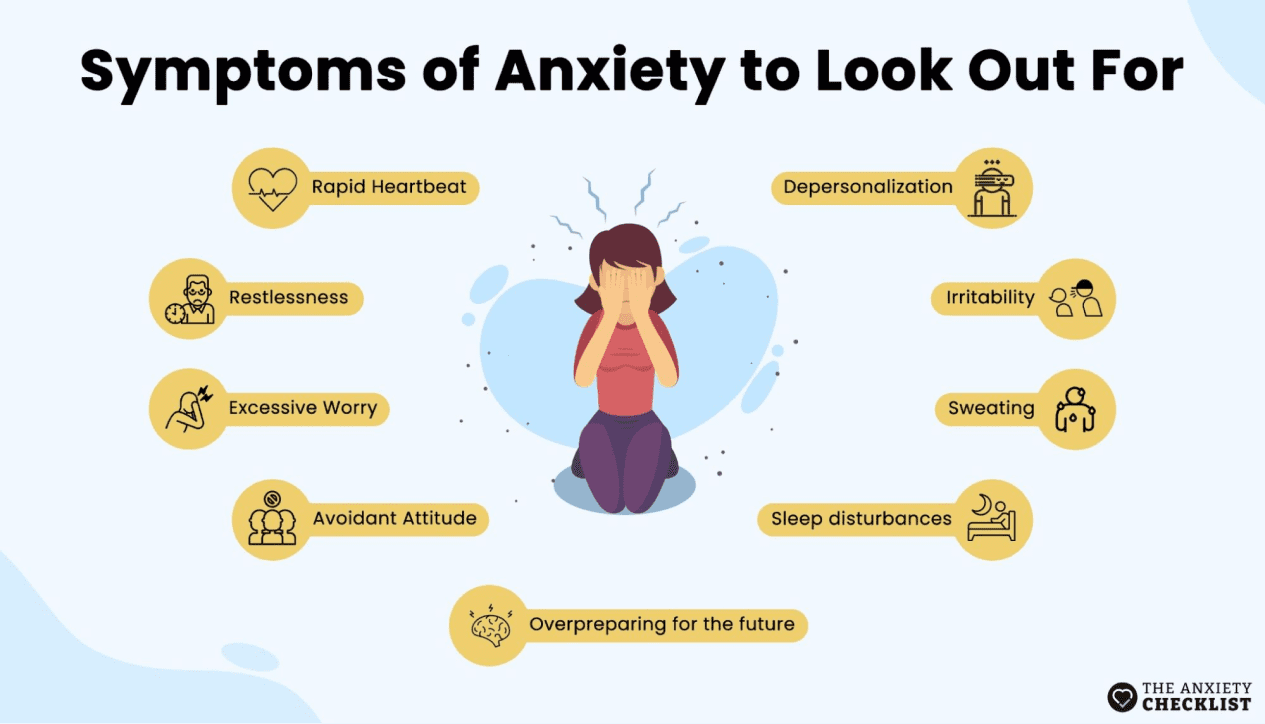
- They'll begin by understanding your medical history and conducting a thorough physical exam. Plus, they might run tests to rule out any other health issues. It's all part of understanding and addressing what's going on.
- If no physical cause is found, your doctor may refer you to a mental health specialist like a psychiatrist or psychologist. They'll ask questions, and use tools and testing to explore the possibility of an anxiety disorder
The diagnosis is generally determined by :
- Your reported symptoms, considering their intensity and duration
- How the symptoms impact your daily life
- An exploration of your attitude and behavior
- You may have observed that when someone faces anxiety, it often brings along other challenges like depression, substance use, PTSD, or OCD.
- While this may sound overwhelming, here’s the thing: recognizing these challenges is the first step in finding the right support. It's like finding a leak in your roof—you wouldn't know where to patch things up if you didn't spot the drip!
Why Do People Avoid Getting Mental Health Diagnoses?
- WHO reports that merely one in four individuals with anxiety disorders seeks treatment for their condition. Worse, many endure these symptoms for extended periods before reaching out for help.
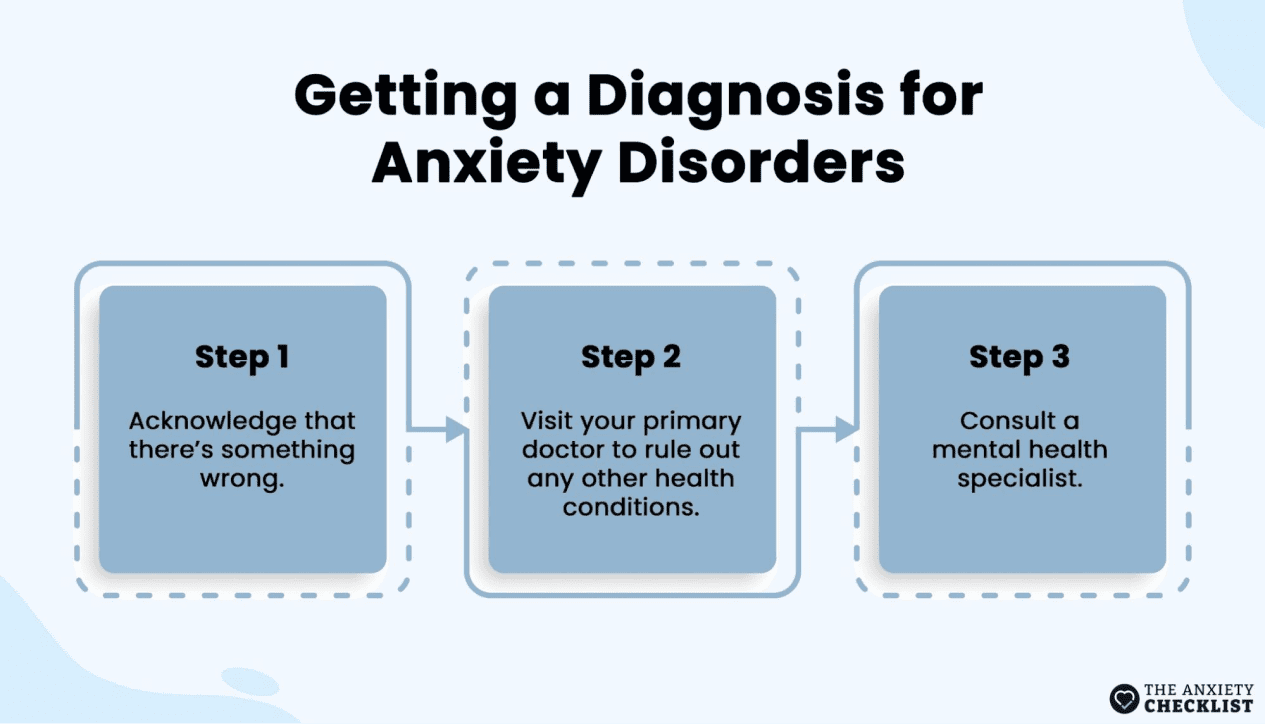
Why is this the case?
- People fear judgment, change, the unknown, and what therapy might reveal
- Some may be too prideful to admit they need help
- Doubts about the efficacy of mental health treatment or a misunderstanding of how it works may hinder progress
- Impatience with the process—change takes time, and finding the right therapist is essential
- High costs associated with treatment
- The assumption that however they're feeling will pass on its own
- If you relate with any of these, go easy on yourself—it happens to the best of us.
- The good news is that solutions are out there for each of these struggles.
- To tackle the hurdle of high costs, for instance, consider group counseling sessions. Giving voice to your anxieties in a safe space can be liberating, making you feel less alone in your journey.
- On the other hand, if pride is holding you back, put yourself in a friend's shoes. If they confided in you about anxiety, would you judge them or encourage them to seek help? It's a game-changer when you think about it that way.
Is It Possible to Cure Anxiety? Exploring Treatments and Solutions
- While there's no way to "cure" anxiety, you can certainly learn ways to manage it better.
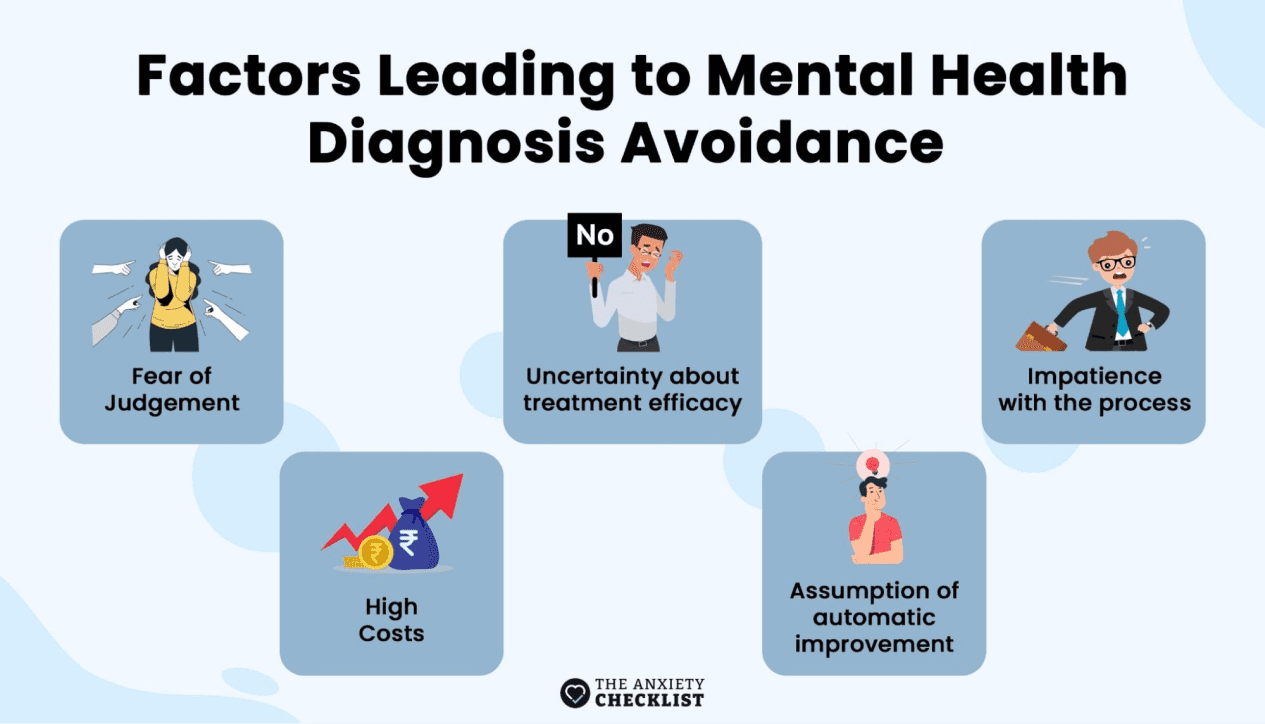
- Over the past few decades, researchers have made significant strides in treating mental health conditions.
- Treatment usually boils down to two main options: talking therapy and medications. Some people find a mix of both works best, while others get relief with just one of them. It's all about finding what suits you best.
1. Psychotherapy
- Imagine you've been canceling plans with friends a lot. Through psychotherapy, you realize it's linked to social anxiety. Understanding this, you work on coping strategies, gradually attend more events, and strengthen your connections.
- That's the power of psychotherapy, commonly known as talk therapy.
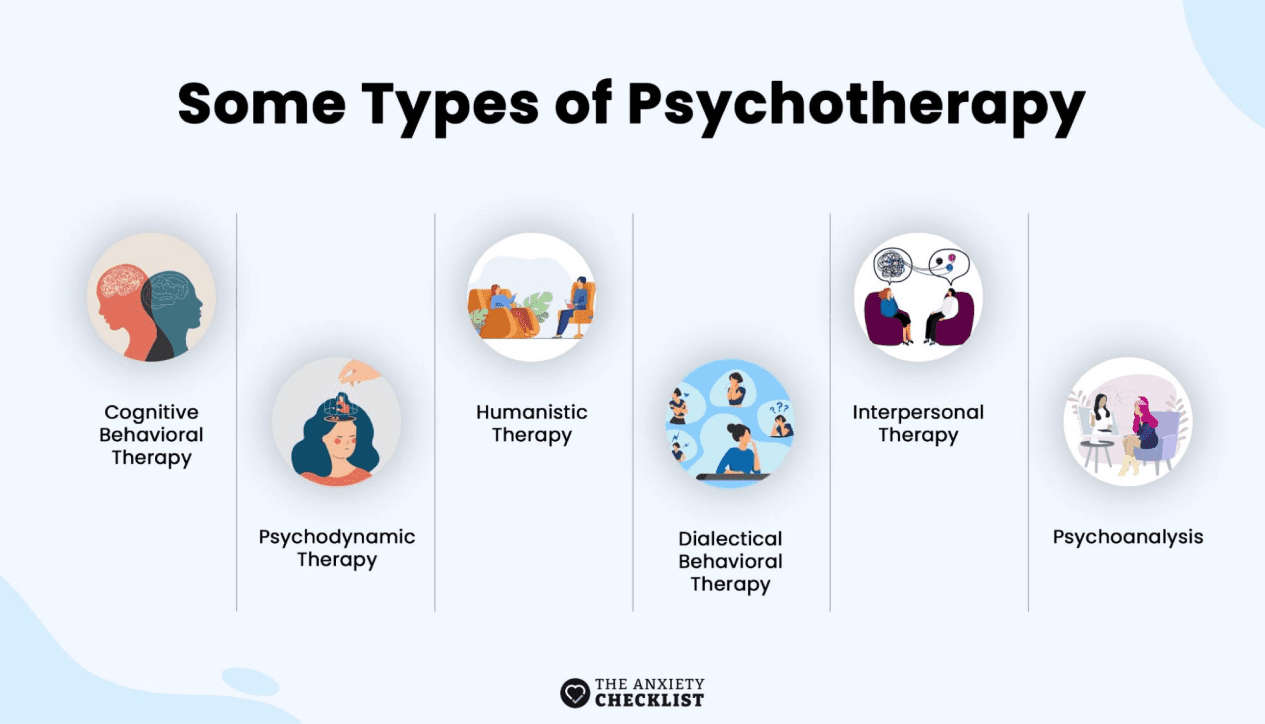
- A therapist will typically ask various questions to understand the link between your experiences, emotions, and thought patterns.
Common types include:
- Can you describe how anxiety feels for you? (physically and emotionally)
- How was anxiety dealt with in your family or childhood?
- What do you hope to gain from learning to manage your anxiety?
- The most effective psychotherapy for anxiety is cognitive behavioral therapy (CBT), though other therapies are also popular, such as Hypnotherapy for anxiety. It empowers you to reshape negative patterns, offering practical strategies for change
2. Medications
- While it might seem tempting to choose one over the other, therapy and medication serve different—but often complementary—roles. Therapy helps you understand and shift thought and behavior patterns, while medication can support emotional and physiological balance by targeting brain chemistry.
- Not everyone needs both. Some people thrive with therapy alone, others benefit from medication, and many find the best results through a combination. Treatment is most effective when tailored to your unique needs in collaboration with a qualified provider.
Now, let's look at some commonly prescribed medications for managing anxiety:
Physical Symptoms
- These medications aim to alleviate symptoms by influencing neurotransmitters like serotonin.
Anti-Anxiety Medications
- Specifically designed to manage anxiety symptoms, these medications often belong to the benzodiazepine class. They work by enhancing the calming effects of neurotransmitters.
Beta-Blockers
- These are primarily used for managing physical symptoms of anxiety, such as a rapid heartbeat and trembling. They essentially block the effects of adrenaline, promoting a sense of calm.
What’s With All The Stigma Around Psychiatric Medication?
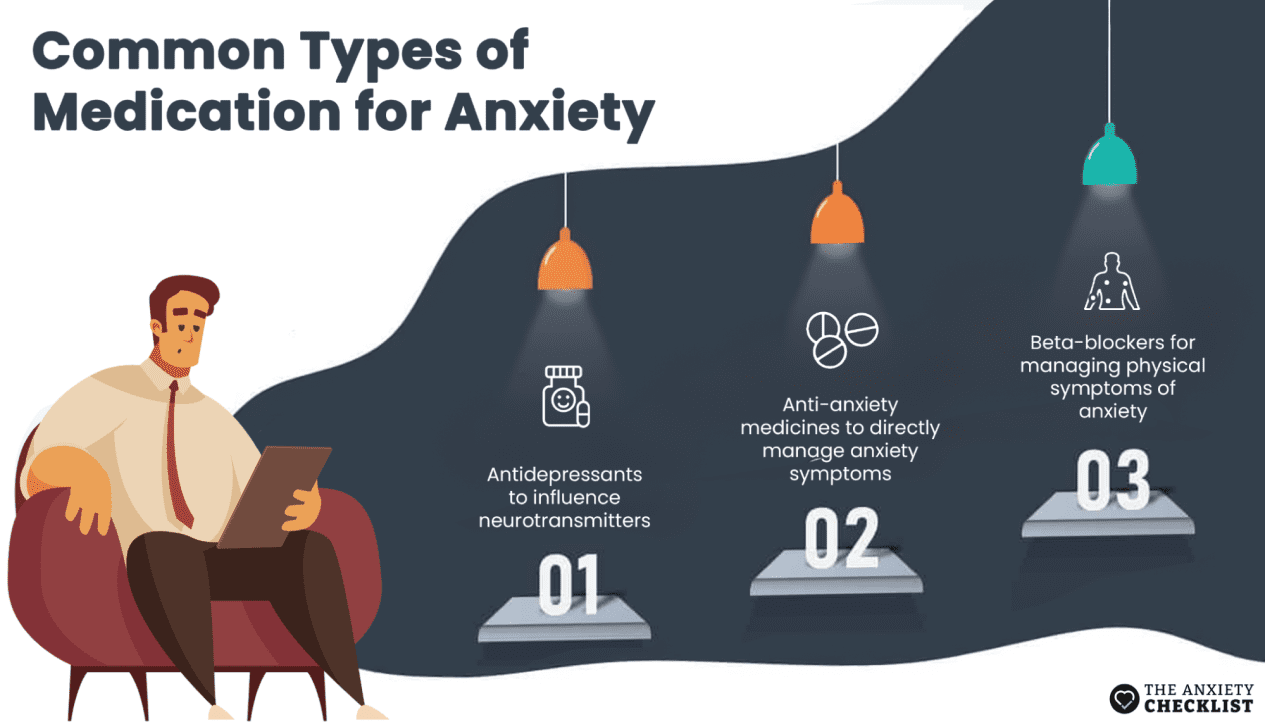
Living with Anxiety: Coping Strategies
- Finding comfort when anxious varies from person to person—whether it's watching a favorite movie, playing video games, taking a long walk, or spending time with a furry friend.
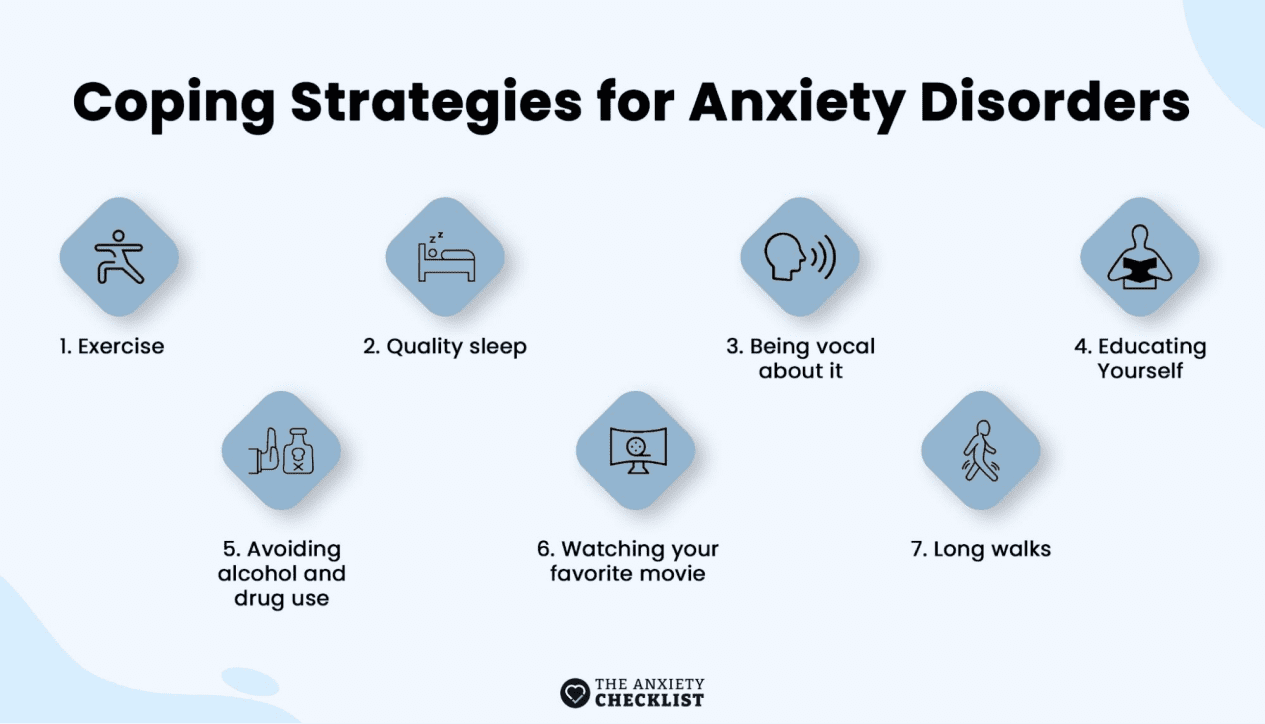
- There's no one-size-fits-all approach; it's about discovering what works for you. Here are additional strategies to consider:
Stay Physically Active
- Incorporate regular physical activity into your routine, even if it's just 10 minutes of stretching. Also, try breathing exercises for anxiety and meditation to help calm your nerves.
Prioritize Good Sleep
- Quality sleep is crucial. It restores neurotransmitters, enhances emotional resilience, and regulates stress hormones.
Talk About It
- Opening up about mental health provides relief and breaks the isolation. Consider sharing your experience with loved ones, or even on social media—it might just help you.
Learn About Your Disorder
- Understand your disorder, ask questions, and be proactive in managing symptoms. You'll see how empathy towards yourself grows with more knowledge about your condition.
Avoid Alcohol and Drugs
- Substance use can worsen anxiety. Seek support from your doctor or a group if you're struggling to quit.
For helpful tools to calm your mind and manage your anxiety, you can also check out our anxiety checklist.
Frequently Asked Questions
Other conditions include Obsessive-Compulsive Disorder (OCD), as well as various phobias marked by irrational fears of specific objects or situations.
However, to be sure, it is best to consult a mental health specialist.
If you are in a crisis or any other person may be in danger - don't use this site. These resources can provide you with immediate help.



